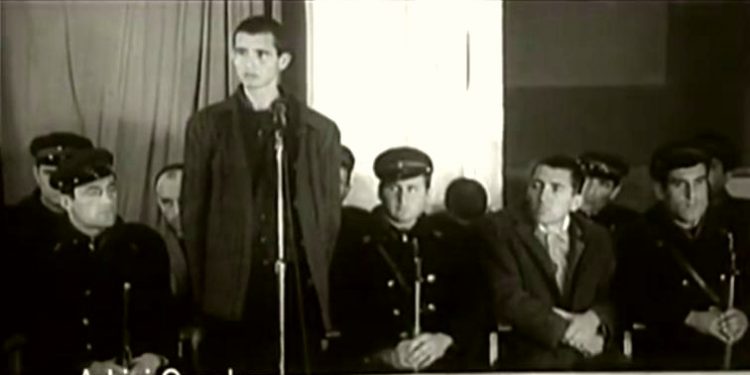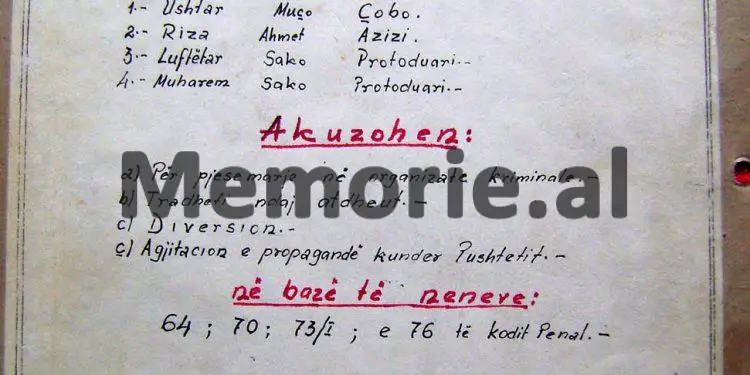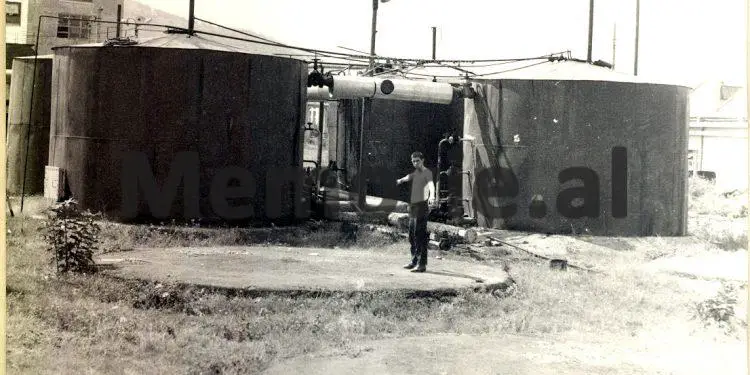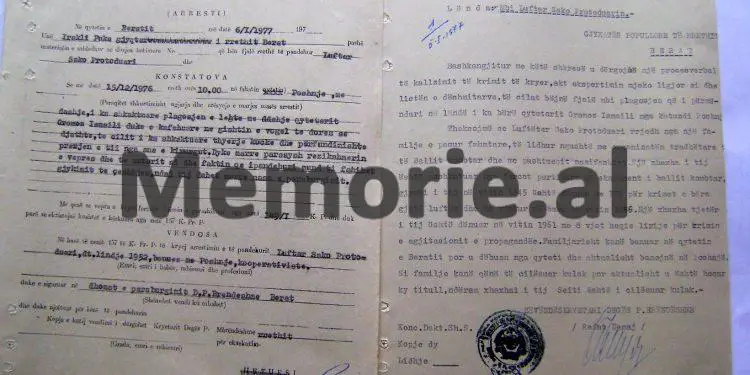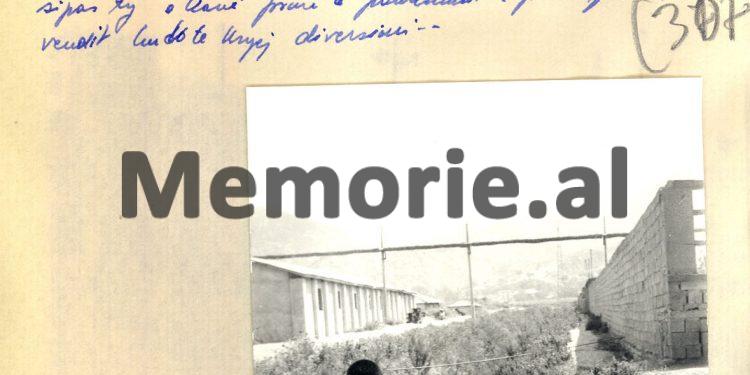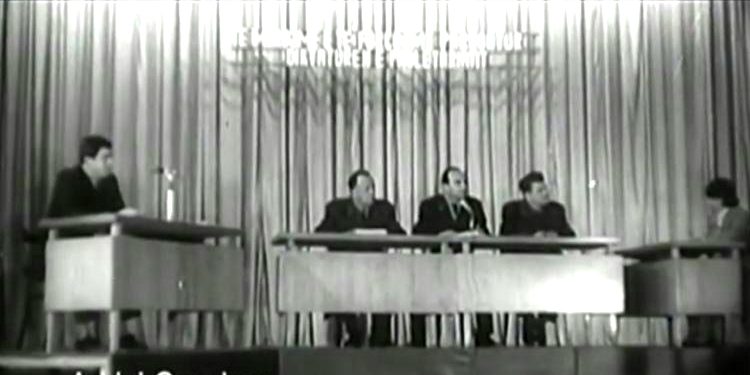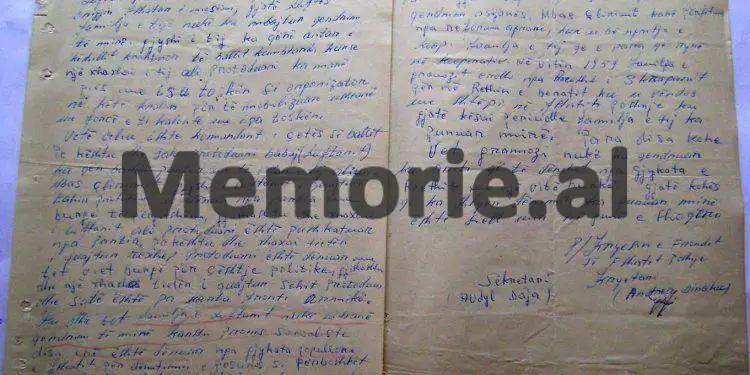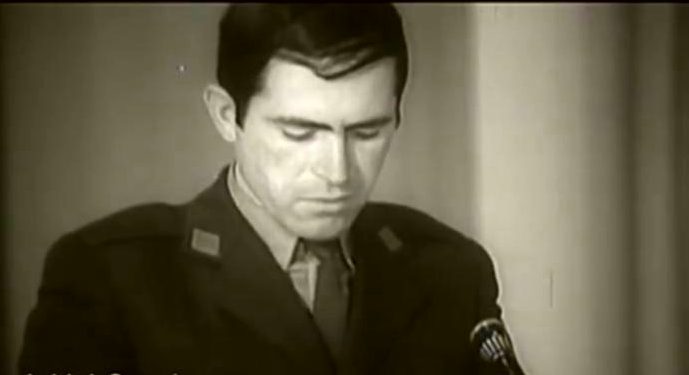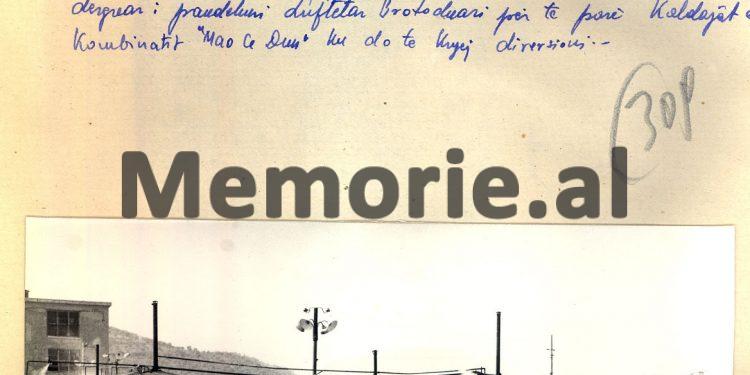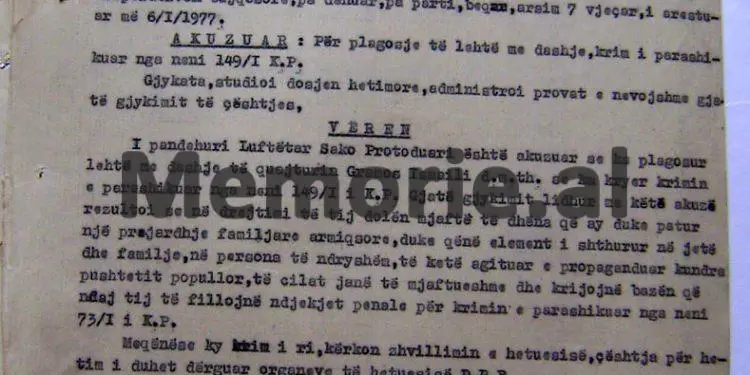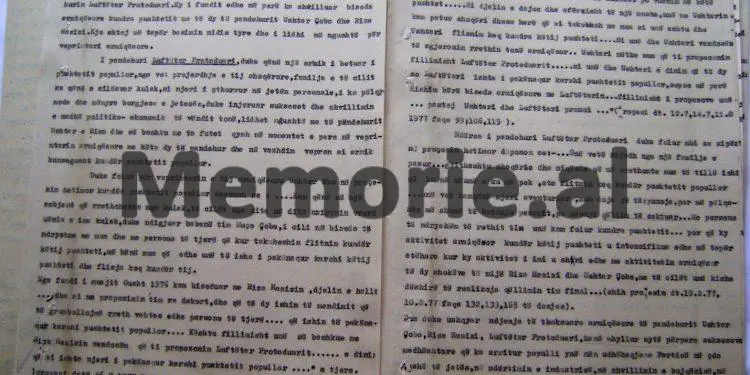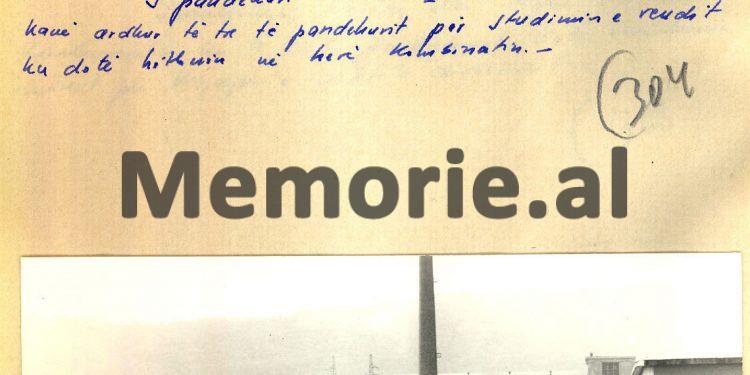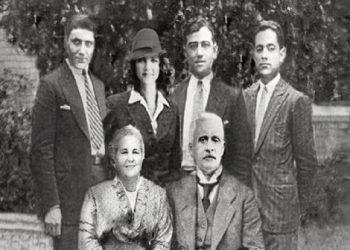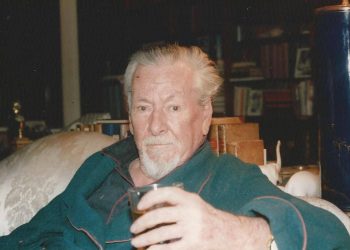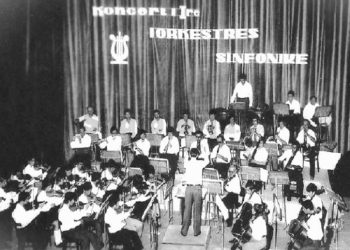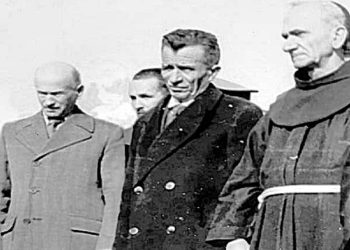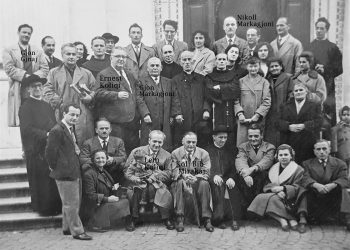By Dr. Qemal Lame
Memorie.al/The state of the dictatorship of the proletariat in the political system of the period of dictatorial socialism staged and propagated that it had “discovered” enemies, traitors, saboteurs, conspirators and coup plotters to strike and eliminate political opponents, as well as to artificially create situations that hid with the platform of class struggle to escalate state violence and divert attention from the serious problems of the political, economic and social crisis. In the “Synoptic Table”, where the plenum of K.Q. who condemned the plot of the polyagent Mehmet Shehu with main collaborators Kadri Hazbiu, Feçorr Shehu, etc., Enver Hoxha himself said that: all the plots were discovered by the Party and none by the State Security!
This statement is clearly understood by all that he was the person who had discovered and condemned the enemies of the people and the Party. His potential opponents who endangered absolute power were eliminated and punished. Those whom he considered the most trustworthy who had been entrusted with the implementation of the orders for the elimination and disappearance of persons declared enemies were also eliminated. This method also hid the evidence, the main witnesses who could become dangerous to his idealized figure even after his death, and any case of investigations with the change of the political system, although it was thought to be eternal.
The tragedy of the violence of the dictatorial state is clearly documented in the secret agency activity of the State Security, the investigation, the prosecution and the court. in Berat. In this issue, we learn the serious consequences of the dictatorship for the punishment of innocent people through the criminal legends of the State Security, approved by the leadership of the ALP and imposed to be legislated by the investigation, the prosecution and the court.
- The trial of the group accused of diversion, sabotage, agitation and propaganda, theft, illegal possession of weapons, etc., at the Textile Factory in Berat.
43 years ago, as it is publicly known, in Berat, two members of the hostile group accused of diversion, sabotage, agitation and propaganda against the state, theft of socialist property, illegal possession of weapons, etc., were severely sentenced to death. who had operated at the Textile Combine.
The accused and convicted were:
– Muharren Sako Protoduari
– Luftar Sako Protoduari
-Riza Hazizi
-Soldier Çobo
- The issue has been biased by senior political leadership. The trial before the people was approved by the leadership of the Central Committee of the ALP.
The organizing measures for the preparation and conduct of the trial were hated and followed continuously by the Secretary of the Central Committee of the ALP, the Minister of Internal Affairs, the General Prosecutor and the President of the High Court.
Due to the importance of the case and the influence it was intended to achieve in public opinion, in order to strengthen the fight against hostile and evil activity and the education of the people, it was decided that the case be tried by the Supreme Court and the General Prosecutor’s Office. High Judicial and Prosecutorial Offices of the Armed Forces, which, according to the Code of Criminal Procedure and the laws “On the organization of the Judiciary” and “On the organization of the prosecution”, operated at these civilian institutions.
Based on the orientations given by the senior leadership and approved directly by Enver Hoxha, it has been propagated in all possible ways by the committee of the Berat district party and those of the Ministry of Defense, corps, brigades and other military units. The preparation of the public opinion and the military for the danger of the hostile group and the importance of judging the case, was organized with comprehensive measures by the party committee of the district of Berat in cooperation with that of the corps of Fier. Orders were given and special meetings were held in the basic party organizations in the Textile Factory, as well as in the military units.
The trial took place in public, in the Cinema Hall, on January 6 and 7, 1978.
The open trial took place in the Cinema hall. Members and relatives of the families of the missing, employees of the combine, citizens who had shown their interest and wanted to get acquainted with the activity carried out by the accused persons were present in the hall.
Almost all the people of Berat had come to the square in front of the Cinema-Theater, on the street, etc. Soldiers and officers were present and present. It was said that only some elderly and very sick person who could not move remained at home and followed the trial by autoplanes and we were heard all over the city. As was the case in other cases of trials before the people, the participants were carefully selected and approved. The list of participants had previously been checked by the Home Affairs Branch and subsequently approved by the District Party Committee.
The leading bodies of the party in the district, in the military units and those in the center, in the Central Committee of the ALP, hailed the trial as a great political success of the war for the detection, severe punishment and prevention of hostile activity. The people have praised the trial in solidarity with the party’s stances and propaganda. The participants supported and applauded the conduct of the trial and the decision announced by the court. Ordinary people, civilians and military, were concretely acquainted with the activity carried out, did not show any doubt in their statements, appreciated the judgment made publicly.
Special articles on the trial have been published in the local newspaper.
The investigation and trial of the case were conducted in accordance with the rules provided in the criminal and procedural provisions.
From the study of the materials administered in the investigative file, it was concluded that:
- The investigative process was documented according to the rules provided in the Criminal Code and the Code of Criminal Procedure.
- The indictments against the defendants have been argued in the evidence and data documented by the investigation.
- The defendants had given explanations even in detail.
- Witnesses also provided detailed explanations.
- The evidence, criminal records, explanations of the defendants and witnesses were harmonized between them and generally formed convictions of the charges and the legal settings provided in the Criminal Code and the Code of Criminal Procedure.
The prosecutor and the judge of the case acted in accordance with the procedural rules for the preparation and adjudication of the case. After being acquainted with the materials of the investigative file, they ascertained the observance of the legal criteria.
However, in their inner conscience, which is a distinguishing feature for investigators, prosecutors and judges, both have also had some ambiguities and doubts about the evidence and guilt of the defendants, which have been assessed to clarify the truth…
The prosecutor and the judge of this case have paid special attention to:
- Detailed explanations of defendants and witnesses.
- The accusations were based on legal evidence, but not convincing on the guilt and truth of the accusations formulated by the branch of internal affairs and had taken legal form in cooperation with the investigation that at that time was within the structure of the Ministry of Interior and under the Minister Interior.
- Of the defendants charged with very serious crimes that provided for a maximum sentence of up to 25 years in prison and death, there was no allegation of guilt for these charges and legal provisions of the Criminal Code.
- No complaint or dissatisfaction was identified by the defendants or witnesses questioned during the investigation process, about the guilt or legal qualifications of the criminal offenses against them, committed separately or in cooperation.
I, Qemal Lame, as the prosecutor of the case, Prosecutor before the High Court, Chief Prosecutor of the Armed Forces, and Ali Zanko, as the judge of the case, chairman of the Military Criminal College in the High Court, have created doubts and had reservations about the charges. , guilt and evidence against the accused and convicted persons.
From the beginning, we have been distracted and we have felt anxiety, mental and conscious tension in professional and intellectual intellectual terms, mainly for two important problems:
- Adherence to legal and procedural norms;
- Objectivity, merits and reliability of investigative and judicial evidence.
These concerns in our legal consciousness could not be formally raised, because:
- Procedural rules were formally applied in the materials of the investigative file.
- The main leadership knew the case well and the concrete and nominated message was given to Qemali and Aliu to judge the case, expressing appreciation and confidence in our ability to judge successfully.
- The General Prosecutor, Rrapi Mino, and the President of the High Court, Aranit Çela, also expressed their confidence in us.
In these circumstances, it was impossible to insist on subjective personal suspicions unfounded in evidence and legal documents of procedural importance. Another very important reason was the objective inability to carry out procedural actions to clarify the suspicions. Likewise, there was no legal basis to decide to return the case for further investigation, as the evidence and documents administered in the investigative file did not allow unfounded suspicions to be raised to enable the case to be returned to the investigator.
Both of us valued leadership trust. However, we also wanted to be careful to justify the assessment, but also to be conscientious in respecting the observance of criminal and procedural rules and giving a fair decision.
At that time, it was dangerous to speak openly about suspicions and concerns about the lack of objectivity that called into question the orientations of the Party leadership, as well as about the agency activity of the State Security.
Our personal opinions were naturally born and influenced by our theoretical and professional legal skills, as well as our personal practice experience as a prosecutor and as a judge.
For these reasons, the suspicion was summed up in the fact that the process that was so documented could have been built on the basis of manipulation of agency and investigative data. Thus, suspicions naturally arose about the lack of objectivity in the prosecution and arrests made, of the grounds on which the criminal case was initiated and the evidence that had been administered and served as the basis for arguing suspicions of guilt and formulating charges against the defendants.
We could not formally raise our subjective suspicions unreservedly expressed in confidential conversations. Objectively and legally, we had no right to question without evidence the work of the State Security and the investigation that was organized and operated jointly with these structures and under the Minister of Interior.
In our legal conscience, the objectivity of the investigations, especially the influence, more precisely the imposition of the investigation by the State Security, to carry out the operative prosecution with the arrest and conviction of the hostile and saboteur group in Berat, in Poshnje, was really disturbing.
The crimes were serious and formally proven and admitted without any objection from the defendants. But, I responsibly emphasize that the prosecutor and the judge were not fully convinced of the veracity and objectivity of the statements of the defendants and witnesses.
More specifically and honestly: Was it strange how the defendants accepted and gave explanations without any reservation for serious crimes of diversion and sabotage and with death sentences?!
On the other hand, we did not have the legal rights and powers to fundamentally verify the previous agency activity, as well as the investigations conducted. As prosecutors and judges of the case, we had no right to request and be acquainted with agency materials and data. Only the Attorney General could request information, in case he had doubts based on evidence and concrete data. These suspicions were required by law to be based on the documents administered in the investigative file.
The Attorney General also did not have the power to verify operational data. The State Security Operational Work Platform prohibited the recognition of operational data by the prosecution and the court.
The impossibility was also influenced by the apparent power and great strength of the Minister of Internal Affairs, Kadri Hazbiu, as a member of the Politburo and as the confidant of Enver Hoxha who received and transmitted direct messages and effectively exercised the final influence in the agency, investigative processes. and judicial. The Attorney General and the President of the Supreme Court accepted these secret reports of subordination and enforcement and supported the implementation of ideas and orders to stage trials for crimes against the state and other serious issues with political interests of maintaining political power.
Whoever was appointed to these high positions and wished to continue to perform the duties in these functions would be compelled to blindly obey and act as commanded from above. With this objective conclusion, I want to emphasize the reality of that time, without defending or accusing the high leaders of the justice of the socialist period that in the propaganda after the change of the political system is qualified as dictatorial communism.
The Constitution provided for the court and the prosecution as independent constitutional institutions, as separate areas of state activity. Their assessment by the Constitution and organic laws was concrete, strong and with full competencies. But in practice, they were treated not with this importance. For matters that endangered and required the employees of the organs of the dictatorship to protect the absolute power, the Constitution and the laws were implemented according to the secret orders of the leader. The leading role of the Party provided for in the Constitution, the daily relations of the leadership with the Ministry of Internal Affairs, putting in the background the prosecution and the court.
The practice followed by the leading bodies of the Party, had made fact and rule mandatory the control, monitoring and direct domination of the judiciary by the main leader. With his direct orders given to the Minister of Internal Affairs, which took the primary, decisive, mandatory role for implementation without any discussion by the heads of the prosecution and the court.
The Minister of Internal Affairs had a special role and importance for the heads of the prosecution and the court, as the belief was created that his opinions were a direct message of the main leader and had to be implemented. The Minister of Internal Affairs, concretely imposed the inferior position of the judiciary in relation to those of the State Security. State security in daily practice, openly or in disguise, stood in a more privileged position than the judiciary, having received the rating as the most beloved and loyal weapon in the hands of the Party, was publicly considered “the eye and ear of the party. ”
With this illegitimate political and administrative power, the State Security really had more power. On behalf of the leader, these administrative agency bodies exercised direct influence and imposition on the prosecution and the court of agency measures and processes for hostile activities when the defendants were arrested and tried. / Memorie.al
Continues in the next issue




